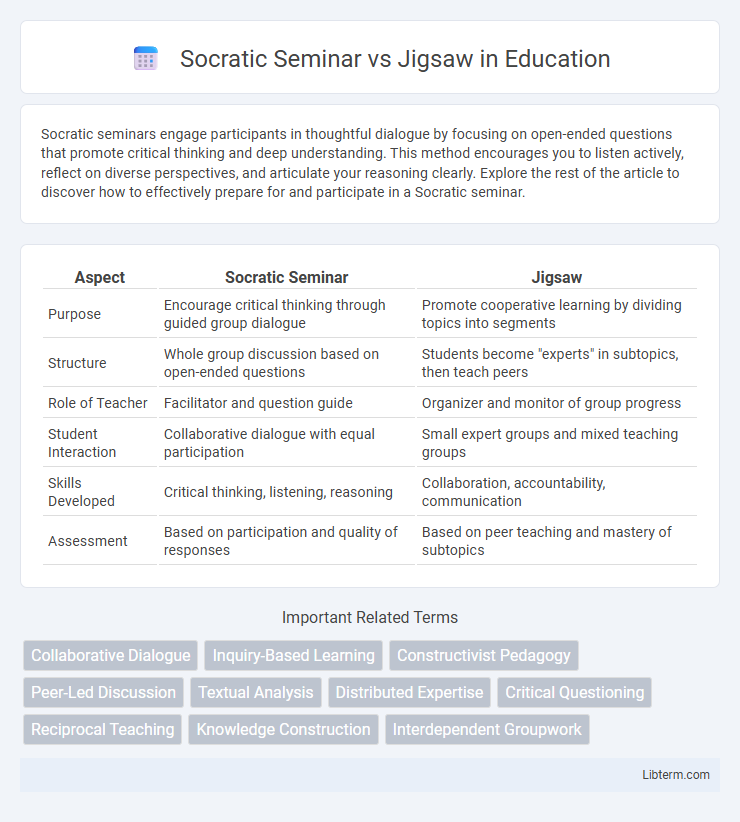Socratic seminars engage participants in thoughtful dialogue by focusing on open-ended questions that promote critical thinking and deep understanding. This method encourages you to listen actively, reflect on diverse perspectives, and articulate your reasoning clearly. Explore the rest of the article to discover how to effectively prepare for and participate in a Socratic seminar.
Table of Comparison
| Aspect | Socratic Seminar | Jigsaw |
|---|---|---|
| Purpose | Encourage critical thinking through guided group dialogue | Promote cooperative learning by dividing topics into segments |
| Structure | Whole group discussion based on open-ended questions | Students become "experts" in subtopics, then teach peers |
| Role of Teacher | Facilitator and question guide | Organizer and monitor of group progress |
| Student Interaction | Collaborative dialogue with equal participation | Small expert groups and mixed teaching groups |
| Skills Developed | Critical thinking, listening, reasoning | Collaboration, accountability, communication |
| Assessment | Based on participation and quality of responses | Based on peer teaching and mastery of subtopics |
Introduction to Socratic Seminar and Jigsaw
Socratic Seminar is a structured discussion method where participants explore complex ideas through open-ended questions, fostering critical thinking and deep understanding of a text or topic. Jigsaw is a cooperative learning strategy that divides a topic into segments, assigning each group member to become an expert on one segment before teaching it to peers, promoting collaboration and accountability. Both methods emphasize active participation and enhance comprehension but differ in their approach to dialogue and information sharing.
Historical Background of Each Method
The Socratic Seminar traces its origins to the teaching practices of the ancient Greek philosopher Socrates, who emphasized dialogue and critical questioning to stimulate deeper understanding and reflection. The Jigsaw method was developed in the early 1970s by social psychologist Elliot Aronson to reduce racial tension in classrooms by promoting cooperative learning and interdependence among students. Both methods have evolved into widely used pedagogical strategies that encourage active participation, but their historical roots highlight different educational challenges and cultural contexts.
Core Principles and Philosophies
Socratic Seminar emphasizes dialogue through open-ended questioning to foster critical thinking, encouraging participants to explore ideas collaboratively and deeply analyze texts. Jigsaw centers on cooperative learning by dividing topics among group members, promoting individual accountability and interdependence as each member teaches their segment to peers. Both methods prioritize active participation and comprehension, but Socratic Seminar focuses on collective inquiry while Jigsaw relies on segmented expertise to achieve group understanding.
Structure and Format Comparison
Socratic Seminar features a whole-group discussion where participants engage in open-ended dialogue guided by a central text or question, promoting critical thinking and deep comprehension. In contrast, the Jigsaw method divides participants into small expert groups to master specific subtopics, then reorganizes them into mixed groups to teach each other, emphasizing collaborative learning and knowledge sharing. The structured turn-taking in Socratic Seminars contrasts with Jigsaw's phased approach of expert and mixed group interactions.
Roles of Teachers and Students
In a Socratic Seminar, teachers act as facilitators guiding open-ended discussions while students engage critically by posing and responding to questions, fostering deep dialogue centered on a shared text. In contrast, the Jigsaw technique requires teachers to organize students into expert groups to master distinct subtopics, after which students teach their peers, promoting collaborative learning and accountability. Both methods emphasize active student participation but differ in teacher roles, with Socratic Seminars focusing on prompting inquiry and Jigsaw on structuring cooperative knowledge sharing.
Benefits of Socratic Seminar
Socratic Seminar fosters critical thinking and deep dialogue by encouraging students to ask questions and engage in reflective discussions based on textual evidence. This method promotes active listening and collaborative learning, enhancing comprehension and communication skills. It also cultivates a supportive environment where diverse perspectives are valued, contributing to higher-order thinking and intellectual growth.
Advantages of Jigsaw Strategy
The Jigsaw strategy fosters collaborative learning by assigning each student a unique segment of the material, ensuring active participation and accountability. This approach enhances comprehension through peer teaching, where students explain their expertise to group members, promoting deeper understanding and retention. Jigsaw also develops communication and interpersonal skills by encouraging cooperative dialogue and diverse perspectives within smaller, manageable groups.
Challenges and Limitations
Socratic Seminar faces challenges such as requiring strong facilitator skills to manage open-ended discussions and ensuring equal participation among students, which can lead to dominance by outspoken individuals. Jigsaw struggles with limitations in group interdependence, as the success of the activity hinges on each member's ability to effectively learn and teach their segment, risking information gaps if any student underperforms. Both methods demand significant preparation time and can be hindered by uneven student motivation or varying levels of background knowledge.
Best Contexts for Implementation
Socratic Seminar best suits environments emphasizing critical thinking and in-depth text analysis, often used in literature and philosophy classes to foster open-ended discussions. Jigsaw excels in collaborative learning settings where content is divided into segments, allowing students to become "experts" on specific topics before teaching peers, commonly applied in social studies and science classes. Both strategies enhance engagement but are optimized for different learning objectives and group dynamics.
Choosing the Right Method for Your Classroom
Selecting the appropriate collaborative learning strategy depends on your classroom objectives and student dynamics. Socratic Seminars foster deep critical thinking and dialogue by encouraging students to engage in open-ended discussions focused on a central text or question. Jigsaw promotes cooperative learning by dividing content into manageable segments, allowing students to become experts in one area before teaching peers, thereby enhancing comprehension and accountability.
Socratic Seminar Infographic

 libterm.com
libterm.com